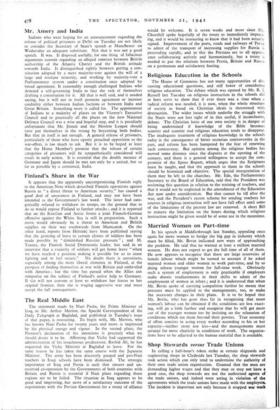Mr. Amery and India
Indians who were hoping for an announcement regarding the release of political prisoners at Delhi on Tuesday are not likely to consider the Secretary of State's speech at Manchester on Wednesday an adequate substitute. Not that it was not a good speech. It was. It disposed usefully, for one thing of fallacious arguments current regarding an alleged contrast between British authorship of the Atlantic Charter and the British attitude towards India. It distinguished rightly between getting a con- stitution adopted by a mere majority-vote against the will of a large and resolute minority, and working by majority-vote a Parliamentary system under a constitution once adopted by broad .agreement. It reasonably enough challenged Indians who demand a self-governing India to face the task of themselves drafting a constitution for it. All that is well said, and it needed saying, but it will not in itself promote agreement or increase cordiality either between Indian factions or between India and Great Britain. Something more is called for. The appointment of Indians to a majority of places on the Viceroy's Executive Council and to practically all the places on the new National Defence Council was a wise and hopeful step, and it is peculiarly unfortunate that Mr. Jinnah and the Moslem League should have put themselves in the wrong by boycotting both bodies. But that in itself is not enough. A general release of prisoners, particularly of those who have openly preached opposition to the war-effort, is too much to ask. But it is to be hoped at least that the Home Member's promise that the release of certain categories of prisoners will be sympathetically considered will result in early action. It is essential that the double menace of Germany and Japan should be met not only by a united, but so far as possible by a contented, India.


























 Previous page
Previous page